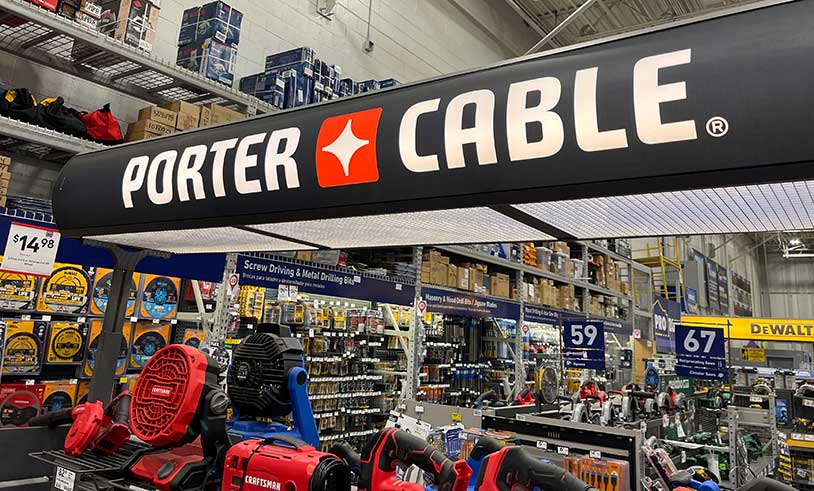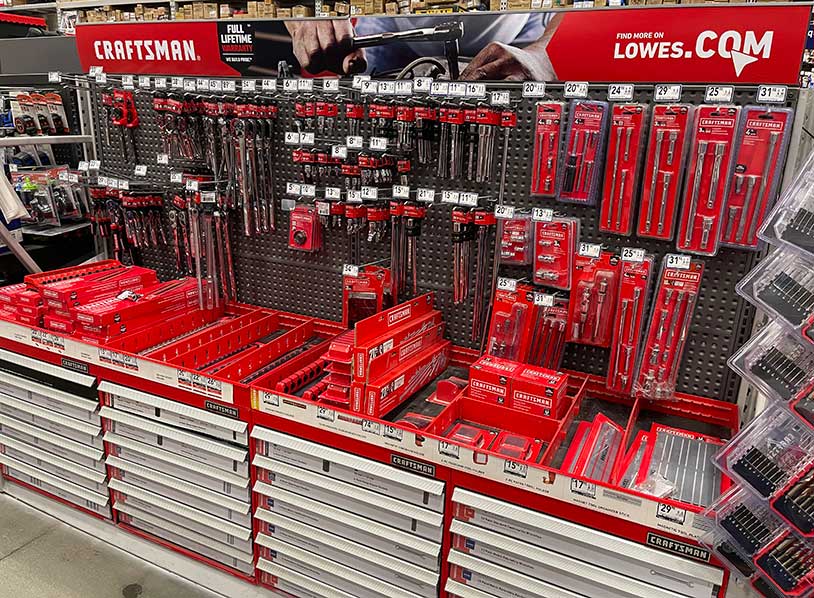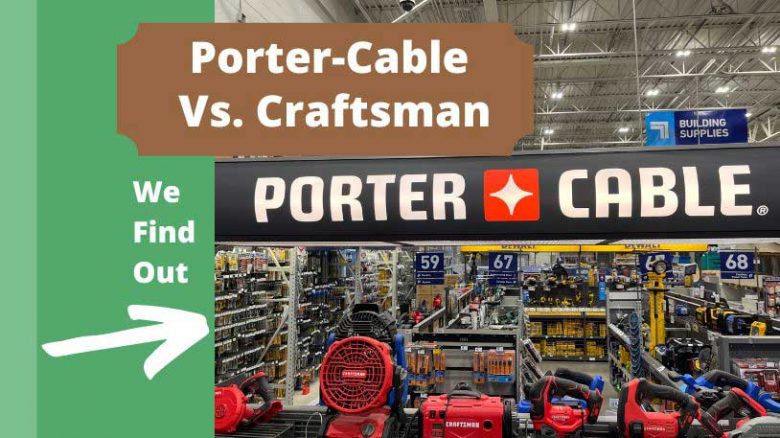Tools are helpful devices that assist us in doing various tasks around the house and with home improvement projects. Manual and power tools save a lot of work when used correctly, but choosing the right brands is essential. Porter-Cable and Craftsman are two of the most popular options, but how do they stack up against each other?
Both Porter-Cable and Craftsman make power tools that can help you fix tractors, cars, barns, and homes. The significant difference between the two companies is that Porter-Cable specializes in power tools, while Craftsman has a much more extensive line of products.
This article will examine the similarities between Craftsman and Porter-Cables, the differences, and your best choice when selecting power tools.
Are Porter-Cable and Craftsman the Same?
Many of us know Porter-Cable and Craftsman’s products and think of them almost interchangeably, but should that necessarily be the case? Are Porter-Cable and Craftsman the same?
Though they are different, Porter-Cable and Craftsman are owned by a joint parent company: Stanley Black & Decker. However, Craftsman has a more diverse catalog of devices and is more prevalent in stores.
These two companies are not the same, but they may share some things in common. We will look at the similarities between the two companies below.
Similarities Between Porter-Cable and Craftsman

There is some common ground between Porter-Cable and Craftsman power tools. Power tools are the main product that Porter-Cable sells. They are popular amongst professionals and everyday people, just like Craftsman power tools are. Both can be used for numerous jobs, such as:
- Fixing fences
- Repairing walls of homes
- Servicing
- Design
- Working on small-engine vehicles
The two products have a similar design as they are both made by Stanley Black & Decker and share some features. Certain things that Porter-Cable and Craftsman power tools have in common are:
- The exact number of battery slots and connections
- A similar lineup of power tool products and batteries
- Similarly limited warranties
Porter-Cable and Craftsman also both offer cordless and corded power tools. This flexibility is an important thing to consider because there may be times when you want to use a cord versus a battery. It is an excellent option that both of these companies share.
Both Porter-Cable and Craftsman have similar reputations. Porter-Cable was traditionally known to make products for professional use only, but over the years, it has developed into more of a household brand name. They make products ranging from nail guns to drills, much like Craftsman does, and offer consumers various products and packages to buy. They both have pretty good overall reputations.
Porter-Cable has been making tools since 1906. They have been making power tools for much of this time, initially focusing on professional tools. Craftsman have also been around for a very long time. They were founded in 1927. Both companies have been affiliated with different tool companies throughout the years. Over time, they have become a brand that amateurs use in their homes and garages for various projects.
You can use these tools for so many different things around your home. In general, they make reliable products that people have trusted over the years. However, there are some stark differences between the two companies and their portfolios.
Differences Between Porter-Cable and Craftsman
One of the main differences between Porter-Cable and Craftsman is the types of products that they sell. While Porter-Cable does offer some products besides power tools like drills and screwdrivers, they have nowhere near the diverse lineup that Craftsman has. Craftsman sells a huge number of different products that do numerous jobs and has become one of the flagship brands within the Stanley Black & Decker family.

Here are some of the products that Craftsman offers that Porter-Cable does not:
- Snow Blowers
- Full Cabinets
- Numerous different saws and drills
Another big difference between Porter-Cable and Craftsman is where they are made. Many craftsman tools are still produced in the USA. Porter-Cable, however, has stopped much of its tool production in the United States. Most of their products are now made in other countries.
Yet another thing that the two companies do not share is availability. Craftsman has been working with Lowe’s for several years now and has thousands of products. You can also find Craftsman tools at other stores and online. Porter-Cable, on the other hand, is becoming harder to find. Watch the YouTube video below from Den of Tools. You can see the difference in availability between the two companies and their products:
This video shows how many options Craftsman has, while Porter-Cable is limited to a few other power tools and batteries. Porter-Cable does make quality power tools for home and light professional use, but they have nowhere near the portfolio that Craftsman does. The two portfolios have striking differences.
Who Has a Better Reputation, Porter-Cable or Craftsman?
Whether or not you can trust a brand is one crucial factor when buying tools, especially power tools. So a very important question to ask yourself is who has a better reputation, Porter-Cable or Craftsman?
While Porter-Cable once had a fantastic reputation for producing professional and at-home tools, its name recognition has waned over the years. Recently, Stanley Black and Decker have put much more emphasis on the Craftsman brand.
Porter-Cable has been around longer and started out as a company with a fantastic reputation. However, after being acquired by Rockwell in the 1960s, they underwent some problems following a rebranding. They did bounce back from this in later decades but have not been able to garner the same attention and adoration as Craftsman over time.
Pros and Cons of Porter-Cable and Craftsman Products
After looking at the similarities and differences between Porter-Cable and Craftsman, it is helpful to identify the pros and cons of each company. Both Craftsman and Porter-Cable have been around for a long time, but they are not without some issues of their own.
Pros and Cons of Porter-Cable
Below is a helpful look at some of the positives and negatives associated with Porter-Cable tools.
Pros
- Affordable tools for home or light professional use.
- They offer a lineup of practical power tools.
- A solid warranty backs up their products.
Cons
- The availability is becoming more scarce.
- The warranty is not as good as that of some other tool makers.
- The product lineup is somewhat limited.
Pros and Cons of Craftsman
Craftsman products are becoming more featured by the brand and affiliates every year. So, it is essential to ask what is good and bad about Craftsman tools. Here is a glimpse into some of the pros and cons of Craftsman products.
Pros
- Craftsman products are becoming increasingly available in stores.
- They make virtually every tool imaginable.
- An above-average warranty backs their products.
Cons
- The tools are built to last but may not stand up to some professional uses.
- The warranty isn’t bad, but it is not a lifetime warranty.
Final Thoughts
Porter-Cable and Craftsman are two names for tools that have been around for around a century. Both products underwent changes in their catalogs and management over the years and are different from when they first started. They are household names for repairs and maintenance and can be found worldwide.
While both are good products, Craftsman has an edge due to increased visibility, an enormous range of products, and availability at major hardware stores. Because Porter-Cable is becoming harder to find, there is some concern about replacement parts and compatible devices being available moving forward.

